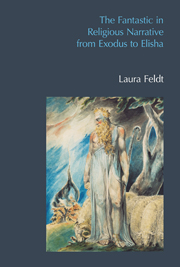Book contents
- Frontmatter
- Contents
- Acknowledgements
- Introduction: More Things—Marvels, Monsters, Miracles
- 1 Fields of Fantasy
- 2 Fantasy and Religious Narrative: Theory and Strategy
- 3 Marvels, Magic and Mystery: Reading the Fantastic in the Exodus Narrative
- 4 Between Wonder and Doubt: Fantastic Strategies, Their Effects and Status in the Exodus Narrative
- 5 Exodus as Mnemo-Fantasy: The Functions of the Fantastic in the Exodus Narrative
- 6 From Ethnogenesis to Everyday Life: Contextualizing the Fantastic in Hebrew Bible Narrative
- 7 Es spukt…—The Fantastic in Religious Narrative
- Bibliography
- Index of Biblical References
- Index of Authors
2 - Fantasy and Religious Narrative: Theory and Strategy
- Frontmatter
- Contents
- Acknowledgements
- Introduction: More Things—Marvels, Monsters, Miracles
- 1 Fields of Fantasy
- 2 Fantasy and Religious Narrative: Theory and Strategy
- 3 Marvels, Magic and Mystery: Reading the Fantastic in the Exodus Narrative
- 4 Between Wonder and Doubt: Fantastic Strategies, Their Effects and Status in the Exodus Narrative
- 5 Exodus as Mnemo-Fantasy: The Functions of the Fantastic in the Exodus Narrative
- 6 From Ethnogenesis to Everyday Life: Contextualizing the Fantastic in Hebrew Bible Narrative
- 7 Es spukt…—The Fantastic in Religious Narrative
- Bibliography
- Index of Biblical References
- Index of Authors
Summary
The field of theories of fantasy and the fantastic and the concomitant critical debate is profuse. This chapter argues the viability of a broad mode-based theory for the present purpose. I then identify the cultural specificity problem (the recognition of the fantastic in other cultures/times) as requiring special attention and as related to the problem of distinguishing the fantastic per se, and I present my take on it. Then, I transform fantasy theory into a fantasy perspective, that is, a fantasy-theoretical strategy of analysis for religious narrative. I specify how I intend to interact with my material on the basis of this perspective, that is, the research questions that guide my exegetical work. Finally, I briefly comment on exegetical prolegomena.
First, I offer a take on the fantasy theory field using a distinction between minimalist, genre-historical understandings of the fantastic/fantasy and maximalist, mode-based theories. The pertinence of this distinction to this study relates to the in- or exclusion of ancient and/or religious narrative within the purview of fantasy theory.
Fantasy Narrative—Ancient and Timeless or Inherently Modern?
Since the 1970s, critical and popular interest in fantasy and fantastic literature has been on the increase. In this type of literature, new and other realities are created; it is a literature replete with monsters, metamorphoses and strange occurrences. Fantastic literature, and horror too, is often said to have sprung from the Gothic tradition to be continued and developed by Hoffmann and Poe (and many others) in the nineteenth century.
- Type
- Chapter
- Information
- Publisher: Acumen PublishingPrint publication year: 2012



